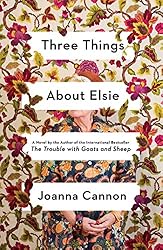Three Things About Elsie
Joanna Cannon, 2018
Scribner
384 pp.
ISBN-13: 9781501187384
Summary
There are three things you should know about Elsie. The first thing is that she’s my best friend. The second is that she always knows what to say to make me feel better. And the third thing…might take a bit more explaining.
Eighty-four-year-old Florence has fallen in her flat at Cherry Tree Home for the Elderly.
As she waits to be rescued, she thinks about her friend Elsie and wonders if a terrible secret from their past is about to come to light.
If the charming new resident is who he claims to be, why does he look exactly like a man who died sixty years ago?
From the acclaimed, bestselling author of The Trouble with Goats and Sheep, Three Things About Elsie is a story about forever friends on the twisting path of life. As we uncover their buried secrets, we learn how the fine threads of humanity connect us all. (From the publisher.)
Author Bio
• Age—40s
• Raised—Derbyshire, England, UK
• Education—Denstone College, Uttoxeter; M.D., University of Leicester Medical School
• Currently—lives in Ashbourne, Derbershire, England
Joanna Cannon is a psychiatrist and a novelist. She grew up in Derbyshire, England, as the only child of a plumber and a giftshop owner. Although she left school at 15 with one O-level, she returned in her 30s to take her A-levels. She was spurred by her resolve to become a doctor and qualified in her early 40s..
Today, Cannon lives in England’s Peak District with her family and her dog. She is the author of Three Things About Elsie (2018) and The Trouble with Goats and Sheep (2015). (From the publisher.)
Read this Guardian article about the author.
Book Reviews
While readers are likely to guess the mysterious "third thing" about Elsie early on, and the book… depend[s on] coincidences, Cannon makes her protagonist sympathetic.… Readers may come for the mystery, but they’ll stay to spend time with Florence.
Publishers Weekly
Older characters are beginning to get their own literature, and Cannon's title is a positive addition that should resonate with elderly citizens and their caretakers everywhere. —Mary K. Bird-Guilliams, Chicago
Library Journal
[T]ender and charismatic…. Cannon effortlessly captures the home’s slow routines, along with the ways that staff and residents coexist but often know little about each other…. This heartfelt tale of friendship and aging explores letting go of the past in order to live fully in the present.
Booklist
(Starred review) Breathes with suspense, providing along the way piercing, poetic descriptions, countless tiny mysteries, and breathtaking little reveals.… [A] rich portrait of old age and friendship stretched over a fascinating frame.
Kirkus Reviews
Discussion Questions
1. Why do you think author Joanna Cannon decided to set the novel in a nursing home?
2. On page 63, Florence says, "I needed someone to hold my worrying for me." How does Elsie play this role for her?
3. The act of naming and renaming things is a recurring theme in the novel. Why do you think this is significant?
4. Did Florence’s failing memory change your understanding of events at Cherry Tree? Does it make her a less reliable narrator? Why or why not?
5. "Simon wondered where his life ended and their life began, and how we could all be stitched so tightly together, yet the threads between everybody still go unnoticed" (page 124). How does this idea of the bonds between humanity play out throughout the novel?
6. "‘You’ve got to find forgiveness, Florence,’ said Elsie. ‘You find it so easily in other people, why do you struggle so much to find it in yourself?’" (page 334). Why do you think Florence struggles to forgive herself for the past?
7. Consider the role of time in novel, especially Florence’s idea of a "long second"—when time seems to hesitate just long enough to give you a chance to make the right decision. Have you experienced any "long seconds" in your life?
8. Florence and Simon both repeat throughout the novel that they have lived very ordinary lives. Do you think this is the case? How do you think ordinary versus extraordinary is measured?
9. "Sometimes, a name is the only thing we can leave behind," Florence says on page 103. Do you think this is true? What else do you think Florence will leave behind?
10. Did the third thing about Elsie come as a surprise to you? Why or why not?
11. What do you think makes Florence ultimately realize that she has lived an extraordinary life, in the end?
(Questions issued by the publishers.)


